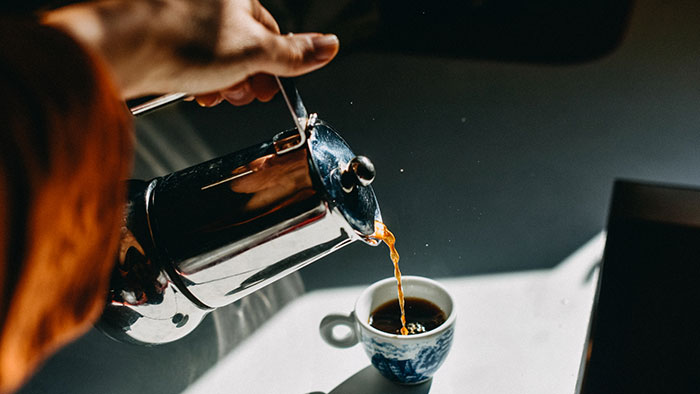How to make your coffee high last longer

Pic via Getty Images.
According to experts, it’s possible to stretch your morning coffee for longer, helping you avoid that mid-morning crash and save some cash. Here’s how.
Words by Mia Erickson for bodyandsoul.com.au
If you’re anything like me and have cut your caffeine consumption down to one cup per day, you’re likely feeling the mid-year strain a little too hard right now.
While I don’t have a super strong dependency on caffeine, I had found myself ordering multiple a day simply out of habit, only to nurse my lukewarm flat white at my desk for hours without ever finishing its contents.
And while it’s never good to jam up your system with unnecessary caffeine, my reasons for cutting my intake stem from the financial strain my $5.50 cuppa
So, I’ve limited myself to buying – or making, if I’m feeling really frugal – one measly coffee before work. But while my bank account is proud of me, my brain certainly isn’t, having severe withdrawals from its second (or third) shot.
But contrary to belief, upping your caffeine intake won’t actually guarantee you sail smoothly through the mid-morning slump, according to experts. While the length of a ‘caffeine-induced’ buzz varies from person to person, the energy effects generally begin to kick in between 15 to 45 minutes after consumption.
Depending on your metabolism, individual tolerance and how much coffee you have consumed, the overall caffeine high could last between three to six hours.
Given most of our work days require more productivity time than that, here are a few ways you can stretch out your peak energy time without drowning yourself in caffeine.
#1. Slow and steady wins the race
As London-based food scientist Natalie Alibrandi explains to Well+Good, taking your time with your morning cuppa may do wonders for prolonging your caffeine buzz.
“Drinking a caffeinated beverage over a longer period of time may help sustain a milder and more prolonged caffeine buzz compared to consuming it quickly all at once,” Alibrandi says. “This is because gradual intake allows for a slower release of caffeine into the bloodstream, potentially reducing the risk of abrupt spikes and crashes in blood sugar and energy levels,” she adds.
#2. Don’t sleep on L-theanine
Pairing your coffee with a source of L-theanine, an amino acid known for its enhancing alertness, could also assist your mid-morning energy crash. This can be found in supplement form, or in caffeinated beverages such as green tea.
“To extend a caffeine ‘high,’ stay hydrated, eat a balanced meal, and consider combining caffeine with L-theanine, which [according to] research, synergises with caffeine for a smoother and longer-lasting buzz, while reducing jitteriness,” says Alibrandi.
READ MORE: Chewing this gum could give you the same high as a coffee
#3. Add a touch of sugar to your order.
While the taste isn’t for everyone, the London-based food scientist says the ingredient – a pantry staple – can actually enhance the effects of a caffeine buzz. “Some research suggests that sugar in energy drinks may enhance caffeine’s initial effects, prolonging alertness and subjective energy,” she says.

#4. Drink coffee after eating breakfast
While it’s tempting to roll straight out of bed and switch your coffee machine on, the nutritionist urges us to wait roughly 60 to 90 minutes after waking up before consuming caffeine, “This allows for the adenosine to get flushed out and allows your body to naturally wake up before you add in caffeine,” she says.
“Recent discussions suggest that consuming coffee after breakfast, rather than before, may help moderate blood glucose levels and potentially extend the duration of a caffeine-induced ‘high,’” she adds. “Blood glucose spikes influence factors like general functioning, appetite, and restlessness, all of which contribute to feelings of being energised, often associated with caffeine consumption.”
READ MORE: This daily habit could be the reason for your insomnia
#5. Focus on your lifestyle
As suspected, the fluctuation of our overall energy levels depends on far more than our coffee order. The nutritionist says it’s imperative that you focus on getting enough sleep, moderate exercise and movement throughout the day, and practice mindfulness too.
“Consumption of high quantities [of caffeine] habitually may increase the likelihood of abuse of caffeine over time, further weakening the strength of a buzz,” she adds, explaining the importance of mindful caffeine consumption over drinking coffee out of habit or convenience.
This article first appeared on bodyandsoul.com.au and may contain links from their affiliate and advertising partners. When you click on them, or share this content, they may earn a commission. Learn more.
Related Topics

UNLOCK INSIGHTS
Discover the untold stories of emerging ASX stocks.
Daily news and expert analysis, it's free to subscribe.
By proceeding, you confirm you understand that we handle personal information in accordance with our Privacy Policy.








